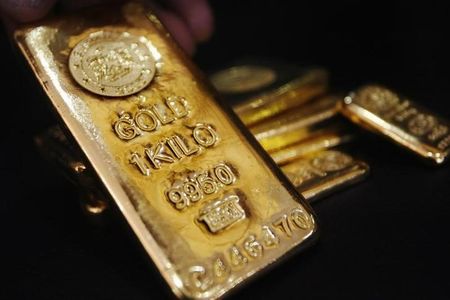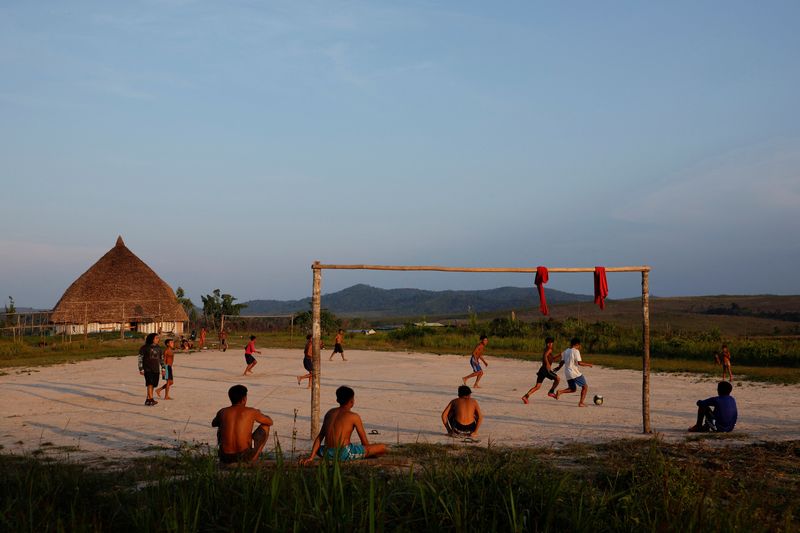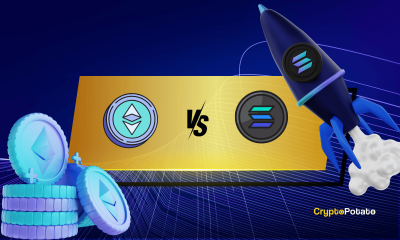Commodities
Brazil says it has nearly cleared gold miners from Amazon Yanomami reservation

By Amanda Perobelli and Anthony Boadle
SURUCUCU, Brazil (Reuters) – Brazil has almost squashed the illegal gold rush that led thousands of wildcat miners into the Yanomami reservation in the Amazon (NASDAQ:) rainforest and caused a humanitarian crisis of disease and malnutrition, the man in charge of operations said.
The Yanomami, South America’s largest Indigenous group living in isolation, have returned to a normal way of life, cultivating crops and hunting game, Nilton Tubino told Reuters in an interview on Friday.
Tubino runs the government office set up by President Luiz Inacio Lula da Silva to coordinate action by police and military forces, environmental agents and health workers on the reservation the size of Portugal in the remote Amazon, where 27,000 Yanomami live.
“We are seeing many of them bathing in the rivers and out hunting again, and clearings being planted for food,” he said.
In hundreds of operations since March, army and navy troops, backed up by environmental and Indigenous protection agencies, have destroyed mining camps and gold prospects.
They have dynamited 42 clandestine airstrips used by the miners in the rainforest, set fire to 18 aircraft, seized 92,000 liters of diesel, sunk 45 dredging barges, destroyed 700 pumps, and dismantled 90 Starlink dishes that allowed the miners to warn each other about enforcement teams, Tubino said. A radar has been set up in the reservation to monitor clandestine planes.
Tubino said deaths from malaria brought by the miners were down, and malnutrition had been controlled with government food parcels. The government has reopened medical outposts and is planning to build a hospital in Surucucu, a remote village near the border with Venezuela.
A Reuters photographer in Surucucu earlier this month saw evidence of illegal miners inside the reservation still, but with the situation improved from last year.
Junior Hekurari, head of the Yanomami health council Condisi, said the government had evicted the miners and overcome the health crisis, but that the mining had affected their ability to obtain food, with river waters polluted by mercury.
“The waters are poisoned and there are no fish,” he said. “Our people believe the earth has been contaminated and that is why the crops are not growing.”
Shortly after taking office, Lula launched a massive enforcement operation in February 2023 to evict some 25,000 gold miners from the Yanomami territory. With backing from the armed forces, the government action succeeded in expelling 80% of the miners.
But once the military withdrew, miners started to return, joining others who had hidden in the forest.

Tubino said the number of miners remaining is unknown, but this year’s operations had significantly reduced their presence and eliminated more than half the gold prospecting areas.
Work is still needed to shut down the supply line that keeps the miners in business, from fuel and food to the buying of their gold nuggets, Tubino added.
Commodities
Oil prices rise; U.S. crude inventories plunge, Russia-Ukraine truce eyed
Commodities
India’s Reliance to stop buying Venezuelan oil over US tariffs, sources say
Commodities
Oil prices climb on Venezuela supply worries

 Forex3 years ago
Forex3 years agoForex Today: the dollar is gaining strength amid gloomy sentiment at the start of the Fed’s week

 Forex3 years ago
Forex3 years agoUnbiased review of Pocket Option broker

 Forex3 years ago
Forex3 years agoDollar to pound sterling exchange rate today: Pound plummeted to its lowest since 1985

 Forex3 years ago
Forex3 years agoHow is the Australian dollar doing today?

 Cryptocurrency3 years ago
Cryptocurrency3 years agoWhat happened in the crypto market – current events today

 World3 years ago
World3 years agoWhy are modern video games an art form?

 Commodities3 years ago
Commodities3 years agoCopper continues to fall in price on expectations of lower demand in China

 Economy3 years ago
Economy3 years agoCrude oil tankers double in price due to EU anti-Russian sanctions

































